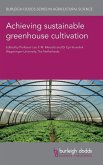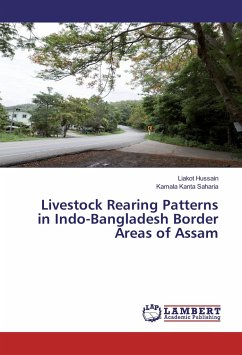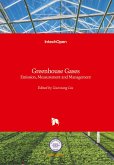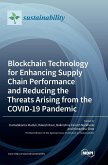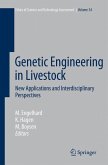Reducing greenhouse gas emissions from livestock production
Herausgeber: Baines, Richard
Reducing greenhouse gas emissions from livestock production
Herausgeber: Baines, Richard
- Gebundenes Buch
- Merkliste
- Auf die Merkliste
- Bewerten Bewerten
- Teilen
- Produkt teilen
- Produkterinnerung
- Produkterinnerung
This collection reviews measurement and modelling of methane emissions and current mitigation strategies, including improving breeding and health, manure management as well as the role of grassland and feed supplements.
Andere Kunden interessierten sich auch für
![Achieving sustainable greenhouse cultivation Achieving sustainable greenhouse cultivation]() Achieving sustainable greenhouse cultivation294,99 €
Achieving sustainable greenhouse cultivation294,99 €![Greenhouse Gases Greenhouse Gases]() Greenhouse Gases110,99 €
Greenhouse Gases110,99 €![Automated Greenhouse for Cocoa Clones Automated Greenhouse for Cocoa Clones]() Carlos Lizardo Corzo RuizAutomated Greenhouse for Cocoa Clones45,99 €
Carlos Lizardo Corzo RuizAutomated Greenhouse for Cocoa Clones45,99 €![Livestock Rearing Patterns in Indo-Bangladesh Border Areas of Assam Livestock Rearing Patterns in Indo-Bangladesh Border Areas of Assam]() Liakot HussainLivestock Rearing Patterns in Indo-Bangladesh Border Areas of Assam46,99 €
Liakot HussainLivestock Rearing Patterns in Indo-Bangladesh Border Areas of Assam46,99 €![Greenhouse Gases Greenhouse Gases]() Greenhouse Gases124,99 €
Greenhouse Gases124,99 €![Blockchain Technology for Enhancing Supply Chain Performance and Reducing the Threats Arising from the COVID-19 Pandemic Blockchain Technology for Enhancing Supply Chain Performance and Reducing the Threats Arising from the COVID-19 Pandemic]() Blockchain Technology for Enhancing Supply Chain Performance and Reducing the Threats Arising from the COVID-19 Pandemic65,99 €
Blockchain Technology for Enhancing Supply Chain Performance and Reducing the Threats Arising from the COVID-19 Pandemic65,99 €![Genetic Engineering in Livestock Genetic Engineering in Livestock]() Friederike Wütscher (Assist. ed.)Genetic Engineering in Livestock41,99 €
Friederike Wütscher (Assist. ed.)Genetic Engineering in Livestock41,99 €-
-
-
This collection reviews measurement and modelling of methane emissions and current mitigation strategies, including improving breeding and health, manure management as well as the role of grassland and feed supplements.
Hinweis: Dieser Artikel kann nur an eine deutsche Lieferadresse ausgeliefert werden.
Hinweis: Dieser Artikel kann nur an eine deutsche Lieferadresse ausgeliefert werden.
Produktdetails
- Produktdetails
- Verlag: Burleigh Dodds Science Publishing
- Seitenzahl: 360
- Erscheinungstermin: 20. Juli 2021
- Englisch
- Abmessung: 235mm x 157mm x 24mm
- Gewicht: 672g
- ISBN-13: 9781786764393
- ISBN-10: 1786764393
- Artikelnr.: 58478201
- Herstellerkennzeichnung
- Libri GmbH
- Europaallee 1
- 36244 Bad Hersfeld
- gpsr@libri.de
- Verlag: Burleigh Dodds Science Publishing
- Seitenzahl: 360
- Erscheinungstermin: 20. Juli 2021
- Englisch
- Abmessung: 235mm x 157mm x 24mm
- Gewicht: 672g
- ISBN-13: 9781786764393
- ISBN-10: 1786764393
- Artikelnr.: 58478201
- Herstellerkennzeichnung
- Libri GmbH
- Europaallee 1
- 36244 Bad Hersfeld
- gpsr@libri.de
Part 1 Analysis 1.Measuring methane emissions from livestock: Deli Chen
University of Melbourne
Australia; 2.Modelling methane emissions from livestock: Laurence Shalloo
Teagasc
Ireland; Part 2 Breeding
animal husbandry and manure management 3.Improving selection for low methane-emitting livestock breeds: Yvette de Haas
Wageningen University
The Netherlands; 4.Quantifying the contribution of livestock health issues to the environmental impact of their production systems: Stephen G. Mackenzie
Trinity College Dublin
Ireland; and Ilias Kyriazakis
Queen's University of Belfast
UK; 5.Improving livestock manure collection
storage and separation: Barbara Amon
Leibniz Institute for Agricultural Engineering
Germany; 6.Developments in anaerobic digestion to optimise use of livestock manure: Yongzhong Feng
Northwest A&F University
China; Part 3 Nutrition 7.The impact of improving feed efficiency on the environmental impact of livestock production: James Drackley
University of Illinois
USA; 8.Improving grassland/forage quality and management to reduce livestock greenhouse gas emissions: Michael O'Donovan
Teagasc
Ireland; 9.The use of feed supplements to reduce livestock greenhouse gas emissions: plant bioactive compounds: Cecile Martin
INRA
France; 10.The use of feed supplements to reduce livestock greenhouse gas emissions: direct-fed microbials: Catherine Stanton
Teagasc
Ireland; 11.Modifying the rumen environment to reduce livestock greenhouse gas emissions: Tim McAllister
Agriculture and Agri-Food Canada
Canada;
University of Melbourne
Australia; 2.Modelling methane emissions from livestock: Laurence Shalloo
Teagasc
Ireland; Part 2 Breeding
animal husbandry and manure management 3.Improving selection for low methane-emitting livestock breeds: Yvette de Haas
Wageningen University
The Netherlands; 4.Quantifying the contribution of livestock health issues to the environmental impact of their production systems: Stephen G. Mackenzie
Trinity College Dublin
Ireland; and Ilias Kyriazakis
Queen's University of Belfast
UK; 5.Improving livestock manure collection
storage and separation: Barbara Amon
Leibniz Institute for Agricultural Engineering
Germany; 6.Developments in anaerobic digestion to optimise use of livestock manure: Yongzhong Feng
Northwest A&F University
China; Part 3 Nutrition 7.The impact of improving feed efficiency on the environmental impact of livestock production: James Drackley
University of Illinois
USA; 8.Improving grassland/forage quality and management to reduce livestock greenhouse gas emissions: Michael O'Donovan
Teagasc
Ireland; 9.The use of feed supplements to reduce livestock greenhouse gas emissions: plant bioactive compounds: Cecile Martin
INRA
France; 10.The use of feed supplements to reduce livestock greenhouse gas emissions: direct-fed microbials: Catherine Stanton
Teagasc
Ireland; 11.Modifying the rumen environment to reduce livestock greenhouse gas emissions: Tim McAllister
Agriculture and Agri-Food Canada
Canada;
Part 1 Analysis 1.Measuring methane emissions from livestock: Deli Chen
University of Melbourne
Australia; 2.Modelling methane emissions from livestock: Laurence Shalloo
Teagasc
Ireland; Part 2 Breeding
animal husbandry and manure management 3.Improving selection for low methane-emitting livestock breeds: Yvette de Haas
Wageningen University
The Netherlands; 4.Quantifying the contribution of livestock health issues to the environmental impact of their production systems: Stephen G. Mackenzie
Trinity College Dublin
Ireland; and Ilias Kyriazakis
Queen's University of Belfast
UK; 5.Improving livestock manure collection
storage and separation: Barbara Amon
Leibniz Institute for Agricultural Engineering
Germany; 6.Developments in anaerobic digestion to optimise use of livestock manure: Yongzhong Feng
Northwest A&F University
China; Part 3 Nutrition 7.The impact of improving feed efficiency on the environmental impact of livestock production: James Drackley
University of Illinois
USA; 8.Improving grassland/forage quality and management to reduce livestock greenhouse gas emissions: Michael O'Donovan
Teagasc
Ireland; 9.The use of feed supplements to reduce livestock greenhouse gas emissions: plant bioactive compounds: Cecile Martin
INRA
France; 10.The use of feed supplements to reduce livestock greenhouse gas emissions: direct-fed microbials: Catherine Stanton
Teagasc
Ireland; 11.Modifying the rumen environment to reduce livestock greenhouse gas emissions: Tim McAllister
Agriculture and Agri-Food Canada
Canada;
University of Melbourne
Australia; 2.Modelling methane emissions from livestock: Laurence Shalloo
Teagasc
Ireland; Part 2 Breeding
animal husbandry and manure management 3.Improving selection for low methane-emitting livestock breeds: Yvette de Haas
Wageningen University
The Netherlands; 4.Quantifying the contribution of livestock health issues to the environmental impact of their production systems: Stephen G. Mackenzie
Trinity College Dublin
Ireland; and Ilias Kyriazakis
Queen's University of Belfast
UK; 5.Improving livestock manure collection
storage and separation: Barbara Amon
Leibniz Institute for Agricultural Engineering
Germany; 6.Developments in anaerobic digestion to optimise use of livestock manure: Yongzhong Feng
Northwest A&F University
China; Part 3 Nutrition 7.The impact of improving feed efficiency on the environmental impact of livestock production: James Drackley
University of Illinois
USA; 8.Improving grassland/forage quality and management to reduce livestock greenhouse gas emissions: Michael O'Donovan
Teagasc
Ireland; 9.The use of feed supplements to reduce livestock greenhouse gas emissions: plant bioactive compounds: Cecile Martin
INRA
France; 10.The use of feed supplements to reduce livestock greenhouse gas emissions: direct-fed microbials: Catherine Stanton
Teagasc
Ireland; 11.Modifying the rumen environment to reduce livestock greenhouse gas emissions: Tim McAllister
Agriculture and Agri-Food Canada
Canada;


